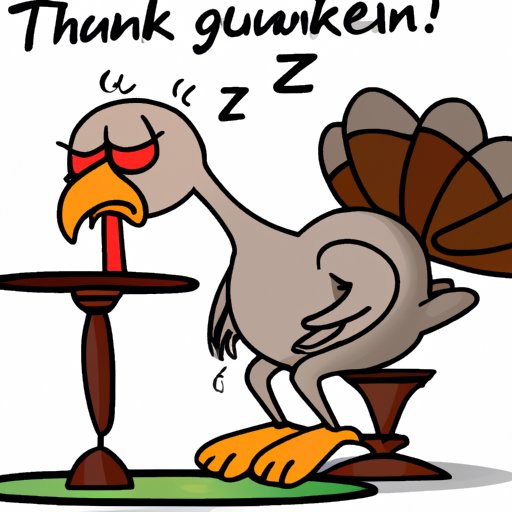
Introduction
It’s Thanksgiving dinner, and you just finished eating a plate of delicious turkey with all the fixings. Suddenly, you feel a wave of fatigue wash over you, making you want to curl up on the couch and take a nap. It’s a common belief that turkey is the culprit behind this post-meal drowsiness, but is there any truth to it? In this article, we’ll explore the scientific explanation behind why turkey makes you tired, debunking the myths surrounding it. We’ll also look at possible remedies for this Thanksgiving-induced fatigue and explore the cultural and social significance of this beloved bird.
Scientific Explanation Behind Why Turkey Makes You Sleepy
Many believe that the amino acid tryptophan, found in turkey meat, is solely responsible for the drowsiness one experiences after a Thanksgiving meal. However, it’s not just the turkey that contains tryptophan – it’s present in many other foods, such as chicken, cheese, and tofu. The reason for the post-turkey drowsiness is more complex than just tryptophan content.
When we consume tryptophan, it’s converted into serotonin and then into melatonin, a hormone that regulates sleep. The more melatonin in our bodies, the more likely we are to feel drowsy. However, the tryptophan in turkey is not enough to cause this effect on its own. Eating a big meal that’s high in carbohydrates and fats, along with alcohol, can also contribute to feeling sleepy. Blood rushes to the digestive system to help digest food, causing a decrease in blood flow to other areas of the body, leading to feelings of drowsiness.
So, while tryptophan does play a role in the post-turkey drowsiness, it’s not the only factor at play.
Personal Account of the Writer’s Experience
As a turkey lover myself, I can attest to feeling tired after consuming this majestic bird. It’s not a feeling I enjoy, especially when there are still desserts to be had. However, I’ve found that taking a walk after dinner or engaging in some light physical activity can help combat the fatigue. Napping is also an option, of course, but it’s not always practical during a holiday gathering. Keeping portion sizes small and avoiding the temptation to over-indulge can also help prevent that post-meal fatigue.
Top Foods That Make You Feel Tired
It’s not just turkey that can make you sleepy after eating it. Here’s a list of the top foods that are likely to make you feel tired:
- Carbohydrates, such as bread, pasta, and rice, which can cause a blood sugar spike and crash
- Dairy products, such as cheese and milk, which contain tryptophan
- Fatty foods, such as chips and fried foods, which take longer to digest, diverting blood flow away from the brain
- Alcohol, which can cause drowsiness and affect sleep quality
- Sugary foods, such as desserts and candy, which can cause blood sugar fluctuations
Turkey is indeed on this list, but it’s not the only food that can cause post-meal fatigue.
Cultural and Social Significance of Turkey
The turkey has a special place in many cultures, particularly in North America, where it’s become a symbol of Thanksgiving. Historically, the turkey was the bird of choice for many Native American tribes and was also a popular food for early American colonists. Today, it’s synonymous with the Thanksgiving holiday and is often the centerpiece of Thanksgiving meals in North America.
Beyond North America, turkey is also a popular food in other parts of the world, such as Europe and Asia. In Europe, turkey is often consumed during the Christmas season, while in parts of Asia, it’s used in soups and stews.
There’s no denying that turkey has a special place in our hearts and is associated with traditions, values, and rituals in many cultures.
Myths Surrounding Turkey and its Supposed Sleep-Inducing Properties
There are many myths surrounding turkey and its supposed sleep-inducing properties. One common myth is that the tryptophan in turkey is similar to the sedative medication, and thus, it causes drowsiness. Another is that the turkey’s dark meat contains more tryptophan than the white meat, and thus, is more likely to cause fatigue. However, neither of these is true. Tryptophan is not a sedative, and while dark meat does contain slightly more tryptophan, the difference is negligible.
So what are some ways people have tried to combat the post-turkey slump? Suggestions range from drinking coffee to taking a shot of apple cider vinegar. While these may work for some, the best course of action is to keep portions small and balanced and incorporate some light physical activity into your post-meal routine.
Conclusion
While turkey may contribute to the post-meal sleepiness, it’s not the only food that can cause this effect. Tryptophan, found in turkey, is not solely responsible for this phenomenon. Eating a big meal, high in carbohydrates and fats, along with alcohol, can also contribute to feelings of drowsiness. However, not all hope is lost. Keeping portion sizes small, incorporating light physical activity after meals, and avoiding overindulgence can all help prevent that post-meal fatigue.




